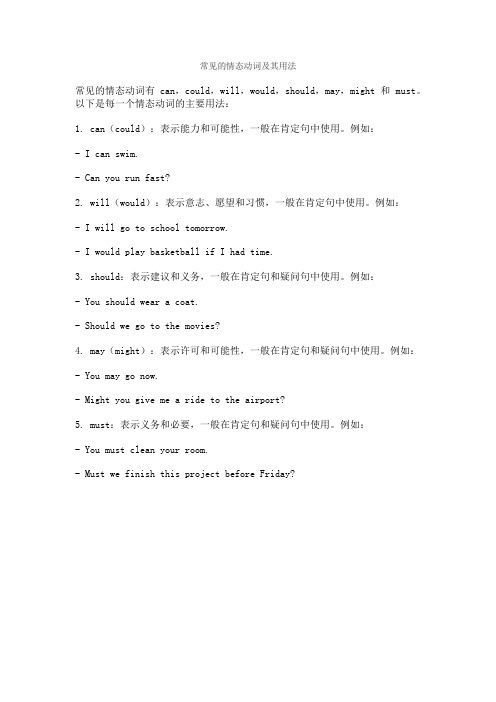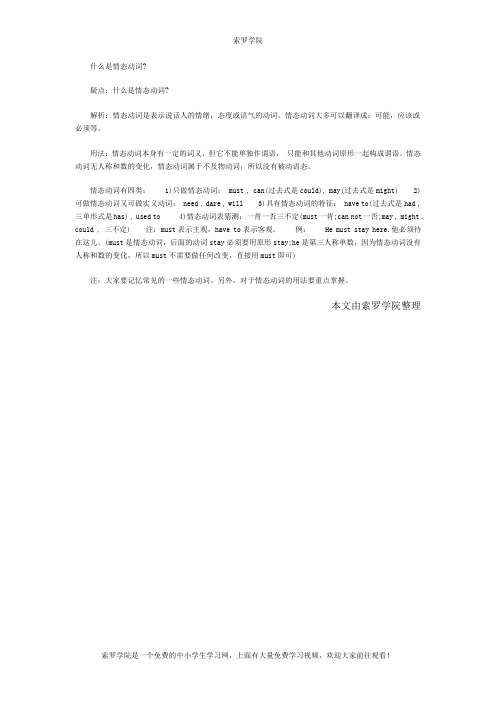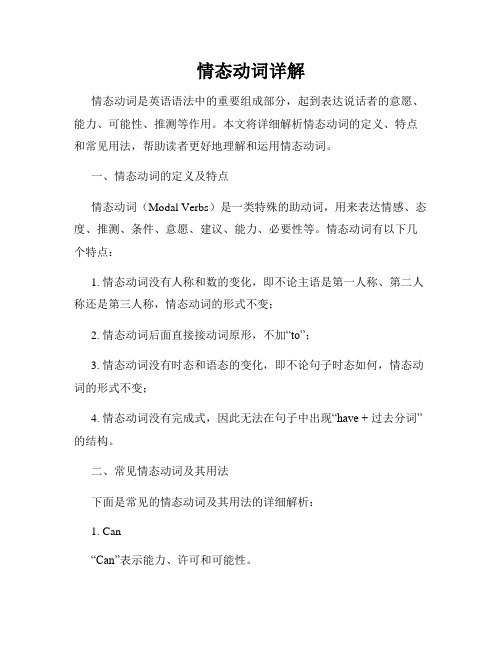情态动词
常见的情态动词及其用法

常见的情态动词及其用法
常见的情态动词有 can,could,will,would,should,may,might 和 must。
以下是每一个情态动词的主要用法:
1. can(could):表示能力和可能性,一般在肯定句中使用。
例如:
- I can swim.
- Can you run fast?
2. will(would):表示意志、愿望和习惯,一般在肯定句中使用。
例如:
- I will go to school tomorrow.
- I would play basketball if I had time.
3. should:表示建议和义务,一般在肯定句和疑问句中使用。
例如:
- You should wear a coat.
- Should we go to the movies?
4. may(might):表示许可和可能性,一般在肯定句和疑问句中使用。
例如:
- You may go now.
- Might you give me a ride to the airport?
5. must:表示义务和必要,一般在肯定句和疑问句中使用。
例如:
- You must clean your room.
- Must we finish this project before Friday?。
什么是情态动词

索罗学院
什么是情态动词?
疑点:什么是情态动词?
解析:情态动词是表示说话人的情绪,态度或语气的动词。
情态动词大多可以翻译成:可能,应该或
必须等。
用法:情态动词本身有一定的词义,但它不能单独作谓语,只能和其他动词原形一起构成谓语。
情态动词无人称和数的变化,情态动词属于不及物动词,所以没有被动语态。
情态动词有四类:1)只做情态动词: must , can(过去式是could), may(过去式是might) 2)可做情态动词又可做实义动词: need , dare , will 3)具有情态动词的特征: have to(过去式是had , 三单形式是has) , used to 4)情态动词表猜测:一肯一否三不定(must一肯;can not一否;may , might , could , 三不定) 注:must表示主观,have to表示客观。
例:He must stay here.他必须待在这儿。
(must是情态动词,后面的动词stay必须要用原形stay;he是第三人称单数,因为情态动词没有人称和数的变化,所以must不需要做任何改变,直接用must即可)
注:大家要记忆常见的一些情态动词。
另外,对于情态动词的用法要重点掌握。
本文由索罗学院整理索罗学院是一个免费的中小学生学习网,上面有大量免费学习视频,欢迎大家前往观看!。
情态动词

2) 用来代替may, 谈现在的情况,口气比may更婉转些: A. 表示“可以”(用may时更多一些) Might (may) I have a little brandy? Might I use your phone? B.表示“可能”,“或许” He might tell his wife. She might not believe your story. 3)用于虚拟条件句: If I had known the film was about China, I might have gone to see it. 要是知道这影片是有关于中国的,我可能就去看了 If you invited him, he might come. 如果你邀请他,他可能会来 If you didn’t mind, we might go there. 如果你要晚到,你可以告诉我一声
情态动词
含义和特征
情态动词只有情态意义,即它表示的是说话人对 动作的观点,如需要、可能、意愿或怀疑等。情 态动词具有以下特征: 1)在形式上,情态动词没有实义动词的各种变化, 只有could、would、had to、was(were) to 、 might等几个过去式,其他的如 must、 ought to 等的过去式与现在式同形。 2) 在意义上,大多数情态动词有多个意义。如 can 可表示可能、能够、允许等,may可表示可 能、允许、目的、让步等。 3)在用法上,情态动词与助动词一样,后面须 接动词原形,构成谓语动词。
might的用法
might 主要由以下用法: 1) 用作may的过去式 A. 表示“可以” I asked if I might go home half an hour earlier today. 我问我是否可以提早半小时回家 He asked if he might use the phone. 他问是否可以用一下电话 B.表示“可能”(或许会) He said he might be late. I guessed he might come tomorrow. C. 用在某些状语从句: I did this so that I might have time to prepare my paper. 我这样做以便我有时间把稿子准备好 Try as she might, she could not persuade her friends to go. 不管她这样想办法,都不能说动她的朋友们去
情态动词归类大全

情态动词一:情态动词的用法:常用的情态动词有can,may,must,need,should, had better.1. can 的用法:①表示能力“能,会” eg: He can speak a little Japanese.他会说一点日语。
②表示请求或许可“可以” eg: Can I help you 要我帮忙吗③表示猜测“可能” eg: Where can she go now 她可能到哪里去了呢的用法:①表示请求或允许“可以”“准许” eg: May I go home,please请问我可以回家吗②表示可能性“可能”、也许” eg: I think it may rain this afternoon. 我想今天下午可能下雨。
注:might为may的过去式,但也可以代替may,语气较为婉转客气或更加不肯定。
eg: ① He might not come today.今天他也许不来了。
(语气不肯定)②You might also get a headache when you work too hard,当你工作太努力时,你也可能患头痛3. must的用法:①表示义务、必要或命令“必须、应该” eg: You must come early tomorrow.你明天得早来。
②表示推测时“肯定,一定” eg: They must be at light is on 他们肯定在家,灯亮着呢.③ must not 禁止,不许 eg: You must not tell lies. 你不许撒谎。
注意:①must开头的疑问句,其否定回答通常用 don't have to 或needn't 。
而不用mustn'teg: ---Must I finish my homework first 我必须先完成作业吗---No, you don't have to/ needn't. 不,你不必。
情态动词详解

情态动词详解情态动词是英语语法中的重要组成部分,起到表达说话者的意愿、能力、可能性、推测等作用。
本文将详细解析情态动词的定义、特点和常见用法,帮助读者更好地理解和运用情态动词。
一、情态动词的定义及特点情态动词(Modal Verbs)是一类特殊的助动词,用来表达情感、态度、推测、条件、意愿、建议、能力、必要性等。
情态动词有以下几个特点:1. 情态动词没有人称和数的变化,即不论主语是第一人称、第二人称还是第三人称,情态动词的形式不变;2. 情态动词后面直接接动词原形,不加“to”;3. 情态动词没有时态和语态的变化,即不论句子时态如何,情态动词的形式不变;4. 情态动词没有完成式,因此无法在句子中出现“have + 过去分词”的结构。
二、常见情态动词及其用法下面是常见的情态动词及其用法的详细解析:1. Can“Can”表示能力、许可和可能性。
能力:用于表达某人在某方面具有的能力或技能。
例句:He can speak three languages.许可:用于征求或给予许可。
例句:Can I borrow your pen, please?可能性:用于表达可能发生的情况。
例句:It can rain tomorrow.2. Could“Could”是Can的过去式,表示过去或虚拟条件下的能力、许可和可能性。
能力(过去):用于表达过去具备的能力或技能。
例句:When I was young, I could run very fast.许可(过去):用于过去征求或给予许可。
例句:Could I use your phone yesterday?可能性(虚拟条件):用于表示虚拟情况下的可能性。
例句:If I had enough money, I could travel around the world.3. May“May”表示允许、可能性、祝愿和推测。
允许:用于征求或给予许可。
例句:May I come in?可能性:用于表达主观推测的可能性。
什么叫情态动词

什么叫情态动词
情态动词是一种本身有一定的词义,表示说话人的情绪,态度或语气的动词,但不能单独作谓语,只能和其他动词原形构成谓语.
We can be there on time tomorrow.
我们明天能按时去那儿.
May I have your name?
我能知道你的名字吗?
Shall we begin now?
我们现在就开始吗?
You must obey the school rules.
你必须遵守校规.
情态动词数量不多,但用途广泛,主要有下列:
can (could),may (might),must,need,ought to,dare (dared),shall (should),will (would) .
情态动词的位置:
情态动词在句中放在谓语动词之前,谓语动词前若有助动词,则在助动词之前,疑问句中,情态动词则在主语之前.
情态动词无人称和数的变化,情态动词后面跟的动词需用原形,否定式构成是在情态动词后面加 "not".个别情态动词有现在式和过去式两种形式,过去式用来表达更加客气,委婉的语气,时态性不强,可用于过去,现在或将来.。
情态动词

School is over. You can go home now. He said I could borrow his bike . We shall be able to finish the work next week.
(6).否定形式 can not could not
2. 表示否定的情态动词的用法。
3. shall 和 will 的多种意义的区别。
4. 情态动词短语的使用。 5. 虚拟语气中情态动词的使用。
5. — Could I borrow your dictionary?
C — Yes, of course you _______.
A. might
B. will
(5).一般疑问句及回答:
--Must I…? --Yes, you must. --No, you needn’t ∕don’t have to.(不,你不必).
e.y:--Must we go to school on time tomorrow? --Yes, you must. --No, you needn’t.
C 1、Can you play ____piano? A、a B、an C、the B 2、Can you dance? yes, I ____. A、do B、can C、 can’t B 3、Can he Write English? No,he ____ A、can B、 can’t C、does C ride a bike ,but I ____drive a car. 4、I __ A、can , can B、 can’t , can’t C、can, can’t A 5、She can _____basketball . A、play B、playing
情态动词

Must I do it at once? Yes, you must. / No, you needn’t.或No, you don’t have to. 或 We must obey all the rules. You must not smoke here. ② must还可表示必然结果 还可表示必然结果 All men must die. 人固有一死。 人固有一死。 If you don’t hurry, you must miss the train. 如果不快点,你必然要误车。 如果不快点,你必然要误车。 2. Have to 着重客观需要,能用于更多事态(过去,将来) 着重客观需要,能用于更多事态(过去,将来) He will have to be there before ten. 10点以前他得到那里。 点以前他得到那里。 点以前他得到那里 As he had broken his leg, he had to lie in bed. 因为断了腿,他不得不躺在床上。 因为断了腿,他不得不躺在床上。 3. Ought to表示义务和责任,“应该”,比should 语气强。 表示义务和责任, 应该” 语气强。 表示义务和责任
- 1、下载文档前请自行甄别文档内容的完整性,平台不提供额外的编辑、内容补充、找答案等附加服务。
- 2、"仅部分预览"的文档,不可在线预览部分如存在完整性等问题,可反馈申请退款(可完整预览的文档不适用该条件!)。
- 3、如文档侵犯您的权益,请联系客服反馈,我们会尽快为您处理(人工客服工作时间:9:00-18:30)。
情态动词:1) You____ all those clothes! We have a washing machine to do that sort of thingA) needn't have washed B) shouldn't have washed C) must not have washed D) can not have washed2) John's score on the test is the highest in the class; he____ last night.A) should study B) should have studied C) must have studied D) must have to study3) The room is in a terrible mess; it ____cleaned.A) can't have been B) shouldn't have been C) mustn't have been D) wouldn't have been4) Nobody knows how people first came to these islands. They ____ from South America on rafts.A) must have sailed B) can sail C) might have sailed D) should have sailed5) Mary was not in her bedroom yesterday afternoon. She ____ in her classroom.A) should have been B) must have been C) must be D) should be6) Bob said he was going to join our club but he didn't. He ____ his mind.A) can't have changed B) wouldn't have changed C) must have changed D) shouldn't have changed7) You____ to town to see the film yesterday. It will be on TV tonight.A) needn't go B) had better not go C) should not go D) needn't have gone8) We____ the letter yesterday, but it didn't arrive.A) must receive B) ought to receive C) must have received D) ought to have received9) With all the work on hand, he____ to the cinema last night.A) mustn't go B) shouldn't have gone C) could not go D) couldn't have gone10) Eve was late for class again. She ____earlier.A) should get up B) must get up C) need to get up D) should have got up11) I am feeling sick. I____ so much chocolate.A) needn't have eaten B) couldn't have eaten C) mustn't have eaten D) shouldn't have eaten12) I didn't send out my application form last week, but I ____.A) had B) would do C) should have D) might have to13) Walking alone in the deserted village, John was scared. He thought he____ Tom to go with him.A) might have asked B) should asked C) must have asked D) should have asked14) When I got to the cinema, the film had already started; I____ there earlier.A) ought to get B) ought to have got C) must have got D) must get15) The road was muddy. It____ last night.A) must rained B) must have rained C) must be rained D) could have rained16) She can speak quite fluent English. She____.A) must been in the U.S.A. for some time B) must have been in the U.S.A. for some timeC) should have been in the U.S.A. for some time D) May be in the U.S.A. for some time17) You should bear in mind that he is not so strong as he____.A) was used to be B) used to be C) was used to D) use to18)“We didn't see him at the exhibition yesterday.”“He ___it.”A) mustn't visit B) can't have visited C) should have gone to see D) may see19) Mary ____my letter, otherwise she would have replied before now.A) should have received B) has received C) Couldn't have received D) ought to have received20) I ____ you a valuable present for your birthday, but I was short of money.A) would have liked to give B) liked to give C) have liked to give D) would like to give21)“Where ____ my umbrella?”“Somebody ____ it away by mistake.”A) is, must have taken B) is, must take C) have been, must take D) is, takes22) What ____ would happen if the director knew you felt that way?A) will you suppose B) you suppose C) do you suppose D) you would suppose23) Two eyes ____see more than one.A) can B) may C) will D) should24) ____ you continue in your efforts and achieve new and greater successes.A) Would B) Will C) May D) Should25) We ought to help each other in our work, ____?A) oughtn't we B) should we C) shouldn't we D) ought to we26) Tom ____ better than to ask Dick for help.A) shall know B) shouldn't know C) has known D) should have known27) You ____ your tooth pulled out before it rot completely.A) had better got B) had to get better C) had better to get D) had better get28) When we got to the cinema, the film hasn't started yet, so we ____.A) needn't hurry B) didn't need hurry C) needn't to hurry D) needn't have hurried29) It was really very dangerous; you ____ him seriously.A) might have injured B) could injure C) should have injured D) must injure30) As he had heart attack, he was told that he ____ continue the work.A) needn't B) may not C) mustn't D) can't31) An Englishman who ____not speak Italian was once traveling in Italy.A) must B) could C) may D) might32) I ____like to make a suggestion.A) could B) would C) must D) might33) I know things are hard with you, but you ____try to get over the difficulties.A) can B) may C) must D) ought34 I can't find the recorder in the room. It ____ by somebody.A) may have been taken away B) may leaveC) may take away D) must have taken away35) He ____the 9:20 train because he didn't leave home till 9:25.A) can reach B) could catch C) may not catch D) couldn't have caught36) They must have finished the work yesterday,_______?A) mustn’t they B) haven’t they C) didn’t they D) needn’t they37)Don’t you find that such problems ________?A) ought to be paid attention B) ought to have been paid attention toC) should have paid attention to D) should pay attention to38)You must have waited here for a long time, _______you?A) haven’t B) mustn’t C) didn’t you D) hadn’t39)He _____ to the meeting this Wednesday, for he have something important to do.A) doesn’t need come B) needn’t come C) need not to come D) needs not to come40) I ______ yesterday, so I went fishing.A) needn’t have gone to work B) didn’t need to go to workC) wouldn’t have gone to work D) didn’t need going to work。
